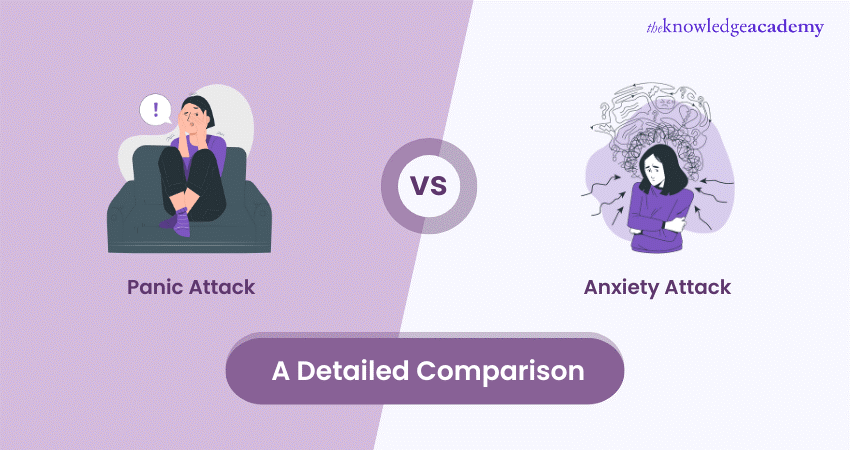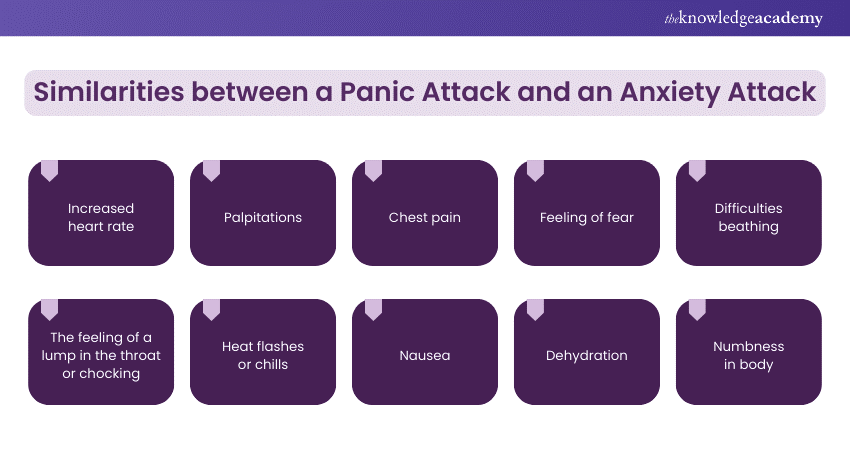We may not have the course you’re looking for. If you enquire or give us a call on + 1-866 272 8822 and speak to our training experts, we may still be able to help with your training requirements.
Training Outcomes Within Your Budget!
We ensure quality, budget-alignment, and timely delivery by our expert instructors.

Have you or someone you cared about had one of those very bad days leading to a moment where it’s hard to breathe, or there is a sharp pain in the chest? That must have been scary! What you or your loved one experienced may have been a Panic Attack or an Anxiety Attack! Knowing the difference between Panic Attack vs Anxiety Attack will help you understand how you can manage the situation accordingly. This may possibly save a life as sometimes these attacks can be fatal.
This blog will teach you all you need to know about Panic Attack vs Anxiety Attack and how they can be similar. It will address their symptoms, causes and risk factors. It will also address the different ways you can manage them.
Table of Contents
1) What is a Panic Attack?
2) What is an Anxiety Attack?
3) Similarities between a Panic Attack and an Anxiety Attack
4) Diagnosis and treatments for anxiety and Panic Attacks
5) Conclusion
What is a Panic Attack?
Panic Attacks can occur out of the blue at any time. Many wake from their sleep in a state of panic, without any specific trigger. However, some experience Panic Attacks with specific triggers based on stress levels and specific phobias. A sense of panic due to a trigger often results in avoidance behaviours, where you may avoid the stimuli that act as a trigger to avoid having a Panic Attack.
A Panic Attack often feels severe; one may find it hard to breathe and have an increased heart rate and sharp chest pains. The frequency of these attacks would classify one to a panic disorder, a type of anxiety disorder.
Symptoms
1) Dizziness
2) Racing heart rate
3) Chest pains
4) Feelings of fear
5) Hyperventilating
6) Shivers
Causes
There are several different factors that may cause a Panic Attack. Here are some types:
Psychological:
1) Chronic stress
2) Low self-esteem
3) Existing Mental Health conditions like Phobia, OCD or PTSD
Pharmacological:
1) Alcohol, drugs or medication withdrawal
2) Medication side effects
3) Excessive intake of caffeine
Environmental:
1) Physical illness
2) Significant changes in life
3) Experience of personal loss
Risk factor
Panic Attacks can be fatal; resulting in an increased heart rate, which if not controlled, can lead one to have a cardiac arrest. The experience overall can be rather traumatic for the person and their loved ones. Children who witness a parent, sibling or close family member have higher chances of having Panic Attacks themself.
Learn how you can prevent psychological distress that can lead to extreme adversities - sign up for our Prevention Psychology Training now!
What is an Anxiety Attack?
Contrary to popular belief, Anxiety Attack is not a technical term that is formally acknowledged. What many people refer to as Anxiety Attacks is simply the experience of being anxious. A restless, jittery feeling, accompanied by irritability, in a way that is overwhelming.
It usually is a response to a situation that may be stressful or feel threatening. It tends to escalate over time and persist for longer. The intensity may differ from mild, moderate to severe.
Symptoms
1) Worry and dread
2) Distress
3) Restlessness
4) Disturbed sleep
5) Irritability
Causes
1) Stress
2) Depression
3) Drug use
4) Phobias
5) Unpleasant events
Risk factor
Anxiety can hold one back from achieving one's goals or targets and completing important tasks. It can hinder day-to-day activity and stunt a person’s development and growth. It may also result in substance abuse, as avoidant behaviour may lead one to consume and rely on substances.
Also Read: How to Reduce Anxiety Immediately
Similarities between a Panic Attack and an Anxiety Attack
As panic disorder is a type of anxiety disorder, they do share a large number of symptoms. However, the intensity of the symptoms may differ. The symptoms are more intense in a Panic Attack, whereas in an Anxiety Attack, they are rather mild. Here is a list of common symptoms that the two share.

1) Increased heart rate
2) Palpitations
3) Chest pain
4) Feeling of fear
5) Breathing difficulties
6) The feeling of a lump in the throat or chocking
7) Heat flashes or chills
8) Nausea
9) Dehydration
10) Numbness in body
Diagnosis and treatments for anxiety and Panic Attacks
As any medical professional would emphasise, self-diagnoses are very unhealthy and can lead to further damage. If you acknowledge yourself or someone you love displaying the symptoms you show, it is best to book an appointment with a General Psychologist or a Psychiatrist.
These professionals will use standardised tests to determine if you have a problem and how severely it persists. Accordingly, they will come up with a treatment plan and specific means for you to manage your symptoms.
The treatment can consist of simple home practices that can help manage symptoms and professional therapy. If the severity is high, hard to manage and potentially life-threatening, then the Psychiatrist would prescribe certain medications to aid in managing Panic or Anxiety attacks.
Home remedies
The recommended measures you can take to reduce your anxiety symptoms are as follows:
1) Limit the intake of alcohol and caffeine
2) Reduce stressors in your environment
3) Establish a healthy diet to avoid lack of nutrition and stay hydrated
4) Get proper eight hours of sleep
5) Practice yoga, meditation and deep breathing exercises.
During an attack:
When you or your loved one is having an attack, here are some ways you can manage the situation effectively:
1) Acknowledge the symptoms you or they are having and remind yourself that it will pass.
2) Breathing techniques are a great way to calm oneself. Practice breathing in counts of four, breath in four counts, hold four counts, breath out in four counts, which is called square breathing. This helps regulate the heart rate and concentrating on your breathing can help deviate your mind from the trigger momentarily.
3) Relaxation techniques is another way to help one calm down. Progressive muscle relaxation technique (tightening and loosening parts of your body in a certain order to help relax) or guided imagery with a friend can help reduce panic and feelings of anxiety.
4) Mindfulness helps you stay grounded in the present moment. It helps to name five things in the room you see, four things that you can touch, three things you can smell, two things you can taste and one emotion you feel.
Aid in creating a safe space for everyone around you with our Mindfulness Training - sign up now!
Medical treatments
Based on the extent of your illness, the mental healthcare providers will formulate a treatment plan. This treatment will consist of therapy and/or medication. Let’s understand them better.
Therapy – Psychological therapy sessions can help identify triggers and manage the symptoms accordingly. It helps come to terms with the past and reasons it may cause anxiety in the present and eliminate it in the future. Cognitive Behavioural Therapy (CBT) is one of the most common therapy plans chosen to help manage anxiety disorders.
Medication – in severe cases, a Psychiatrist may prescribe one or two of the four kinds of medications to help manage symptoms. The four types are as follows:
a) Selective serotonin reuptake inhibitors (SSRIs)- These are a type of antidepressant that increase the serotonin levels in the brain.
b) Serotonin and noradrenaline reuptake inhibitors (SNRIs)- These are another type of antidepressant that increase serotonin and noradrenaline in the brain.
c) Pregabalin – If the antidepressants don't work, the doctor may prescribe you with pregabalin, an anticonvulsant. That minimises seizures and the severity of epilepsy and reduces symptoms of anxiety.
d) Benzodiazepines – These are often prescribed as short-term or SOS medication to take when you have an unmanageable attack. These are a form of sedative and should not be over-consumed.
Conclusion
This blog explained the difference between Panic Attack vs Anxiety Attack. It also shed light on their symptoms, causes and risk factors. Additionally, this blog addressed their similarities, diagnoses and treatment options. If you or someone you love are troubled by either, we hope this blog helped you understand them and recommend you reach out to a mental health specialist.
Learn to manage stress mindfully and build resilience with our Handle Stress And Develop Your Resilience Training - register now!
Frequently Asked Questions

Yes, Panic Attacks can happen without any specific trigger. You may even have one in your sleep. It can also be a result of high levels of stress.

The physical symptoms can lead to fatality and should be attended to by a doctor. Meanwhile, you must try to practice deep breathing exercises.

The Knowledge Academy takes global learning to new heights, offering over 30,000 online courses across 490+ locations in 220 countries. This expansive reach ensures accessibility and convenience for learners worldwide.
Alongside our diverse Online Course Catalogue, encompassing 17 major categories, we go the extra mile by providing a plethora of free educational Online Resources like News updates, Blogs, videos, webinars, and interview questions. Tailoring learning experiences further, professionals can maximise value with customisable Course Bundles of TKA.

The Knowledge Academy’s Knowledge Pass, a prepaid voucher, adds another layer of flexibility, allowing course bookings over a 12-month period. Join us on a journey where education knows no bounds.

The Knowledge Academy offers various Health & Safety Courses, including Advance First-Aid Training, Active and Healthy Lifestyle Training, and Counselling Certifications. These courses cater to different skill levels, providing comprehensive insights into What is Yoga.
Our Health & Safety Blogs cover a range of topics related to Panic and Anxiety Attacks, offering valuable resources, best practices, and industry insights. Whether you are a beginner or looking to advance your Health and Safety knowledge, The Knowledge Academy's diverse courses and informative blogs have you covered.
Upcoming Health & Safety Resources Batches & Dates
Date
 Anxiety Courses
Anxiety Courses
Fri 10th Jan 2025
Fri 14th Feb 2025
Fri 11th Apr 2025
Fri 23rd May 2025
Fri 8th Aug 2025
Fri 26th Sep 2025
Fri 21st Nov 2025







 Top Rated Course
Top Rated Course



 If you wish to make any changes to your course, please
If you wish to make any changes to your course, please


